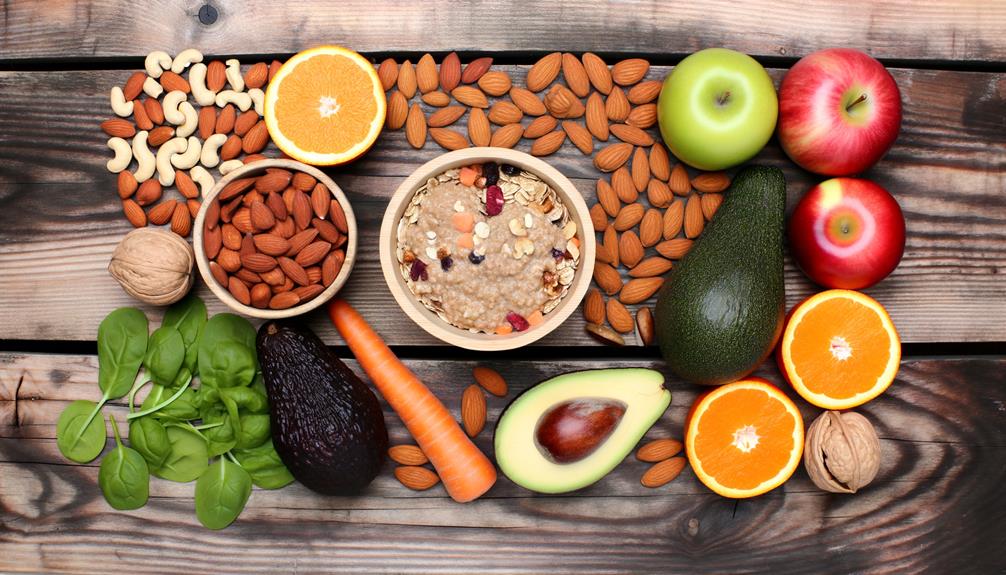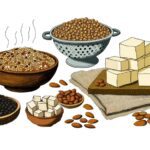Imagine you’ve just received your latest bloodwork results, and the numbers are clear: your cholesterol levels are higher than you’d like. You’re not alone in this journey toward better health—many are turning to a vegan lifestyle to manage their cholesterol. As you explore this path, you’ll find that ditching the dairy and skipping the steak isn’t just about what you’re missing out on; it’s about the wealth of nutritious alternatives you’re about to embrace. From the fiber-rich legumes that bind to cholesterol and escort it out of your body to the unsaturated fats in avocados that support heart health, each aspect of vegan eating contributes to a more balanced lipid profile. You might be wondering, though, beyond these broad strokes, what specific steps can you take to ensure your cholesterol levels benefit from your plant-based choices? Stick around, and you’ll uncover the top seven ways a vegan lifestyle can help you keep those numbers in check, and perhaps you’ll even find a new favorite heart-healthy dish along the way.
Key Takeaways
- Eliminating saturated fats from animal products and choosing plant-based alternatives is an effective way to lower cholesterol levels.
- Incorporating plant sterols and stanols through fortified foods can further enhance the cholesterol-lowering effects of a balanced vegan diet.
- Consuming soy protein can help lower LDL cholesterol levels and increase HDL levels, contributing to improved heart health.
- Following a vegan lifestyle not only lowers cholesterol but also offers additional benefits such as reducing the risk of heart disease, supporting the environment, and promoting overall health and well-being.
Eliminating Saturated Fats
Cutting out saturated fats, primarily found in animal products, is a powerful step you can take to lower your cholesterol and boost your heart health. When you embrace a vegan diet, you’re not just nurturing yourself; you’re also serving the well-being of others by fostering a more sustainable and compassionate world.
Animal products, especially those high in saturated fats like certain meats and dairy products, are often the culprits behind elevated LDL cholesterol—a type of cholesterol linked to heart disease. By eliminating saturated fats from your diet, you pave the way for lower cholesterol levels and a healthier heart. Moreover, a plant-based diet rich in fruits, vegetables, and whole grains naturally contains less saturated fat and more heart-protective nutrients.
Swapping out butter for olive oil and choosing plant-based alternatives can significantly reduce your intake of saturated fats. This simple change not only aligns with a life of service to others and the planet but also marks a commitment to personal health. By favoring a vegan diet, you’re taking a proactive stance against heart disease and fostering a life filled with vitality and care for all beings. Remember, each meal is an opportunity to nourish your body and reflect your values.
Increasing Fiber Intake
While you’re redefining your eating habits to avoid saturated fats, don’t overlook the importance of boosting your fiber intake with a bounty of plant-based foods for an even healthier heart. Soluble fiber, particularly, has a stellar reputation for its role in lowering LDL cholesterol, the kind that you’re aiming to keep in check. Embrace a colorful variety of fruits and vegetables, and discover the heart-healthy benefits they offer.
Your vegan diet is already a step in the right direction, steering clear of foods high in saturated fats and dietary cholesterol. By focusing on whole grains, legumes, nuts, and seeds, you’re not just filling your plate with nature’s goodness, but you’re also significantly increasing your fiber intake. Aim for at least 25 to 30 grams of daily fiber to see a positive impact on your cholesterol levels.
Plant Sterols and Stanols
Embrace the power of plants beyond their fiber content; plant sterols and stanols are your heart’s allies, naturally helping to lower cholesterol levels. When you incorporate foods rich in these compounds into your vegetarian or vegan diet, you’re taking proactive steps to maintain healthy cholesterol and combat high cholesterol.
Here are some ways to harness their benefits:
- Look for fortified foods: Many plant-based foods that include sterols and stanols are readily available. Margarine, plant-based milks, and some orange juices are now fortified with these cholesterol-fighting friends.
- Check labels: When shopping, keep an eye out for products enriched with plant sterols and stanols to ensure you’re adding the right items to your cart.
- Balance your diet: While these compounds are helpful, they’re most effective as part of a balanced diet that’s low in saturated fats and high in foods rich in vitamins and fiber.
- Consistency is key: Regular consumption can lead to a significant lower total cholesterol level, so make it a habit to include these products in your meals.
Soy Protein Benefits
Harness the nutritional prowess of soy protein, a complete source of essential amino acids that can significantly reduce LDL cholesterol and potentially boost HDL levels, supporting a heart-healthy vegan lifestyle. By embracing plant-based eating, you’re not only distancing yourself from animal products and saturated fats but also making room for soy protein benefits that can play a pivotal role in your quest to lower cholesterol and fend off cardiovascular disease.
| Soy Protein Benefits | Impact on Cholesterol |
|---|---|
| Complete Protein | Lowers LDL |
| Isoflavones | May Increase HDL |
| Less Saturated Fats | Reduces Heart Risk |
Integrating soy into your vegan lifestyle offers a dual advantage. You’re opting for a wholesome substitute that’s kind to your body and the planet. As you replace the saturated fats commonly found in animal products with soy’s heart-healthy compounds, you’re actively contributing to your own well-being and serving others by example.
Nutrient-Dense Whole Foods
Dive into the world of nutrient-dense whole foods, where every bite offers a symphony of essential vitamins, minerals, and antioxidants that work tirelessly to lower your cholesterol and nurture your heart. Embracing a plant-based diet teeming with these vegan foods is not just a cultural shift; it’s a commitment to your health.
When you choose whole foods, you’re choosing life and vibrancy. These foods are the stalwarts against high blood pressure and bad cholesterol, paving the way for good cholesterol to flourish. Here’s how they serve you:
- Fruits and Vegetables: Rich in fiber and plant sterols, they block cholesterol absorption.
- Legumes: Powerhouses like beans and lentils are high in fiber, which binds to cholesterol.
- Nuts and Seeds: These provide healthy fats and omega-3 fatty acids, which are known to reduce heart disease risk.
- Whole Grains: Intact grains maintain their bran and germ, offering a full spectrum of nutrients and fiber.
Each choice you make is a seed planted for a healthier future. Whole foods in a vegan diet aren’t just nourishment; they’re your daily dose of preventive medicine, combating the foes of heart health with every nutrient-dense morsel. Together, these elements harmonize to keep you at your best, serving your body and the planet with every sustainable bite.
Weight Management Support
As you nourish your heart with whole foods, you’ll also discover that a vegan lifestyle is a natural ally in managing your weight effectively. Embracing a plant-based diet, you’ll indulge in foods that are not only kind to your body but also to the world around us. This compassionate choice aligns with a desire to serve others, including the fellow beings with whom we share our planet.
Plant-based diets are inherently rich in fiber, a powerful component that helps you feel full longer, thus supporting your weight management journey. The beauty of eating a variety of fruits, vegetables, whole grains, and legumes lies in their low calorie density and high nutrient profile, which means you’re fueling your body with what it truly needs without the excess calories that often come from foods high in saturated fat.
Antioxidant-Rich Diet
Feasting on a cornucopia of antioxidant-rich foods like vibrant berries, crunchy nuts, and verdant leafy greens can play a pivotal role in lowering your cholesterol and enhancing your heart health. Embracing a plant-based diet teeming with these natural wonders, you’re not only nourishing yourself but also serving the greater good by promoting sustainable food choices.
Here’s how an antioxidant-rich diet benefits your body:
- Combats inflammation: Antioxidants help reduce inflammation, a culprit behind chronic diseases.
- Protects from oxidation: They prevent the oxidation of cholesterol, which can lead to arterial plaque.
- Boosts HDL levels: Consuming antioxidant-rich foods can increase ‘good’ HDL cholesterol.
- Promotes heart health: A diet rich in antioxidants is associated with a reduced risk of heart disease.
A diet lower in saturated fats and devoid of highly processed foods is fundamental in managing cholesterol levels. As you opt for a diet rich in whole, unprocessed plant foods, you’re stepping away from the saturated fats often found in animal products. The benefits of a vegan lifestyle extend beyond just your health; it’s a conscious choice for the well-being of the planet and all its inhabitants. Your heart—and the hearts of those you serve—will thank you for this compassionate and healthful approach to living.
Frequently Asked Questions
How Do Vegans Lower Cholesterol?
Imagine you’ve swapped burgers for beans and your cholesterol’s dipped. You’re eating more whole grains, nuts, and green veggies, upping your fruit and legume intake, and enjoying soy products—all boosting your cardiovascular health.
How to Reduce Cholesterol in 7 Days Vegetarian?
To reduce cholesterol in a week, start with an oatmeal breakfast, up your fiber intake, and include nuts, avocados, olive oil, whole grains, soy products, and legumes in your meals daily.
Is Vegan Protein Good for High Cholesterol?
Yes, vegan protein is your heart’s friend, offering soy benefits and nutrient absorption that support heart health. Diverse protein sources bust cholesterol myths, with fiber intake and omega-3 sources sidelining saturated fats.
Are Eggs Bad for High Cholesterol?
You’ve heard the egg controversy; they’re not great for high cholesterol due to saturated fats and dietary cholesterol. Opt for omega-3-rich plant sterols and egg substitutes to maintain heart health and nutritional balance.







